The Iliad (Penguin Classics) Read online
Page 35
Then they would have made a miserable retreat back from the Greek ships and huts towards windswept Ilium, had not Polydamas gone up to daring Hector and said:
Polydamas tells Hector to regroup
’Hector, you are an obstinate man when it comes to taking good advice. Just because the god gave you uncommon fighting ability, you like to think you know better than anyone else about tactics too. But (730) you cannot possibly take responsibility for everything. The god gives men differing gifts. One man can fight, another dance, another sing poetry to the lyre; and yet another is endowed by far-thundering Zeus with a good brain, to the advantage of many of his friends. It saves them from disaster time and again, as he knows even better than they do.
‘However, I will tell you what I think best. The fighting has blazed up all round you in a ring. Our great-hearted men certainly stormed the wall, but having done so some are now standing idle under arms, while others are scattered among the (740) Greek ships and fighting against odds. So withdraw and call in all your best men. We could then consult and settle the whole question whether to fall on their ships, if the god wishes to give us a decisive victory, or failing that to withdraw from them intact. I, for one, am afraid the Greeks are going to pay us back for what we did to them yesterday. They have got a man biding his time beside their ships who is insatiable for battle; and I can’t believe he will keep out of the fighting altogether.’
So spoke Polydamas, and his timely advice seemed excellent (750) to Hector. He replied and spoke winged words:
‘Polydamas, stay here and keep all the best men round you, while I go and deal with the situation over there. I shall soon be back when I’ve given them my orders.’
He spoke and sped away, looking like a snow-capped peak, and as he passed swiftly through the Trojan ranks and those of their allies, he shouted to his men. They all ran up when they heard Hector’s voice and massed themselves round Panthous’ son, amiable Polydamas. But Hector went up and down the (760) front line looking to see if he could find Deiphobus, strong lord Helenus, Adamas son of Asius or Asius himself, son of Hyrtacus. He found not one of them alive or uninjured. Two had fallen to the Greeks and lay dead by the sterns of the ships, while the others were back within the town wall, wounded at long or short range. But he did find one man quickly enough, on the left flank of the battlefield with all its tears, and that was godlike Paris, husband of lovely-haired Helen. Paris was encouraging his men and urging them into battle. Hector went up to him and insulted him:
‘Paris, you parody, with your wonderful looks, you sex- (770) crazed seducer, where, I ask you, are Deiphobus and strong lord Helenus, Adamas son of Asius, and Asius son of Hyrtacus? And where, please, is Othryoneus? This is indeed the end of steep Ilium, from top to bottom. There is nothing for you now but death.’
Godlike Paris replied:
Paris tells Hector of Trojan losses
’Hector, you’re blaming an innocent man in your rage. If I have ever shrunk from fighting, my mother still did not bear an utter coward; and from the moment you told your men to attack by the ships, we’ve held our ground here and kept the Greeks engaged relent (780) lessly. The friends you ask about are killed, except Deiphobus and strong lord Helenus who have withdrawn. Each was wounded by a long spear in the arm, but Zeus saved their lives.
‘Lead us now wherever you wish. We’ll follow you with a will and, I think, with no lack of courage either, so far as we are able. What a man cannot do, however committed, is fight beyond his ability.’
With these words the warrior Paris pacified his brother, and they went off together into the sound and fury of battle, which (790) was raging now round Cebriones and matchless Polydamas, Phalces, Orthaeus, godlike Polyphetes, Palmys, and Ascanius and Morys, who had arrived as replacements from fertile Ascania on the morning of the previous day, and now Zeus inspired them to fight.
Ajax and Hector exchange threats
The Trojans came on like an angry squall that swoops down from Zeus’ thunder-laden sky: it throws the ocean into indescribable turmoil, where innumerable waves of the sounding sea hiss and arch their foaming backs in a never-ending procession – (800) so the Trojans came on behind their leaders, rank after rank, glittering with bronze, and with Hector, equal of the murderous War-god Ares, at their head. In front of him he held his rounded shield with its close layers of hide and covering of beaten bronze, and his gleaming helmet nodded on his temples. Hector sprang forward and probed the enemy line at various points in the hope that it would break before him as he charged under the cover of his shield. But he did not shake the Greeks’ resolution. Ajax first challenged him, striding confidently forward:
(810) ’Brilliant Hector, do come closer. Why are you trying to terrify the Greeks like this? We do know something about war; it is just that we have been under Zeus’ evil whip. I suppose you imagine you’re going to destroy our ships. But we too have hands ready to fight for them and likely to capture your fine town and sack it, long before you get our ships. As for you, I say the time is drawing near when you will take to your heels and pray to Father Zeus and the other gods to make your (820) lovely-maned horses faster than falcons as they carry you back home to Ilium in clouds of dust.’
As he spoke a bird flew by on the right, a high-soaring eagle. The Greek troops were heartened by the omen and shouted for joy. But glorious Hector replied:
‘Ajax, you’ve got it wrong, you great oaf. What are you talking about? If only I could be as certain of spending my days as the son of Zeus who drives the storm-cloud, with the lady Hera as my mother, and be honoured as Athene and Apollo are honoured, as I am of this day proving disastrous to the Greeks, all of them. You’ll die with the rest of them, if you dare to stand (830) up to my long spear which is going to feast on your lily-white skin. Yes, you’ll fall by your own ships, and your flesh and fat shall glut the Trojan dogs and birds of prey.’
With these words Hector led off, and his men came after him with a mighty roar, while the whole force behind them took up the cry. The Greeks answered with their own war-cry and, summoning up their courage, awaited the onslaught of the Trojans’ best. The clamour from the two armies reached the upper air and the very eye of Olympus.
14
ZEUS OUTMANOEUVRED
1–152: Nestor finds Odysseus, Diomedes and Agamemnon all wounded. Odysseus attacks Agamemnon for cowardice. POSEIDON heartens Agamemnon with a speech.
153–360: HERA decides to send ZEUS to sleep by making love to him. She decks herself out, gets APHRODITE’s love charm and persuades SLEEP to join her. HERA and ZEUS make love and ZEUS falls asleep. SLEEP tells POSEIDON he can carry on helping the Greeks.
361–439:POSEIDON rallies the Greeks, and Aj ax takes Hector out of the fighting with a rock.
440–5 22: A series of killings ensues. The Trojans are routed and run.
The din was so great that it reached the ears of Nestor who was drinking in his hut, and he spoke to Machaon with winged words:
‘Godlike Machaon, we must consider what to do. The cries of our brave young men are growing louder by the ships. You sit here for the time being and drink your sparkling wine, till Hecamede has heated some water and washed the congealed blood from your wound. I’ll find some place where I can see what is going on.’
With these words Nestor picked up a well-made shield of (10) gleaming bronze that was lying in his hut and belonged to his son horse-taming Thrasymedes, who was using his father’s. He took a strong spear too with a sharp bronze point and had no sooner stepped outside his hut than he saw a shocking sight – the Greeks in full rout with the proud Trojans close on their heels. The Greek wall had fallen.
As the great open sea heaves under a soundless swell; it vaguely senses the onset of a whistling gale, but the waves cannot begin their march this way or that till the wind sets in decisively (20) from one quarter or the other – so the old man faltered between two courses, unable to make up his mind whether to join the Greeks with their swift horses in the fight o
r to seek out Agamemnon shepherd of the people. In the end he decided the best thing was to go to Agamemnon. Meanwhile, the fighting and slaughter continued, and the hard bronze rang out on men’s bodies as it met the thrust of sword or curved spear.
Greek despair (11.252, 377, 437)
On his way, Nestor fell in with the leaders who had been wounded, Diomedes, Odysseus and Agamemnon. They were coming up from their ships which were stationed on the shore of the grey sea a long (30) way from the present fighting. The reason was that the first ships to arrive had been hauled up well inland on the plain, and it was by their sterns that the wall had been built. For the beach itself, wide as it was, had proved unable to hold all the ships, and the Greeks, cramped for room, had drawn them up in rows covering the whole seaboard of the long bay from headland to headland. So, in order to get a view of the battle, the leaders were making their way inland together, propping themselves up on their spears, deeply depressed. When they met the old man (40) Nestor, their hearts sank further. Lord Agamemnon spoke to him and said:
‘Nestor son of Neleus, great glory of the Greeks, why have you turned your back on the killing fields and come down here? I am afraid imperious Hector is going to carry out the threat he made in the speech to his men – that he would never fall back from the ships to Ilium till he had sent them up in flames and slaughtered us as well. That was the promise he made them, and now everything he said is coming true. Hell! The whole army (50) must be as furious with me as Achilles is, if they refuse to make a stand by the sterns of the ships.’
Nestor the Gerenian charioteer replied:
‘Some such disaster is certainly upon us, and high-thundering Zeus himself could not avert it. We thought the wall was an impregnable defence for the ships and ourselves. That has now fallen, and our men are faced with a long and desperate fight beside the swift ships. Look as hard as you will, you cannot tell whether the Greeks are being chased and harried from the front (60) or the rear, so confused is the slaughter – and the din reaches the skies. We should now consider what to do next – if thinking can do any good. But I don’t advise we go into battle ourselves. No wounded man can fight.’
Agamemnon lord of men replied:
‘Nestor, since the fighting has reached the sterns of ships, and neither the strong wall nor the ditch that cost the Greeks so much effort has been of any use, though they looked on them as an impregnable defence for the ships and ourselves, then this, I suppose, is how almighty Zeus must want it to be – the Greeks (70) destroyed here, far from Greece, with no trace left. I felt this when he was helping the Greeks with all his heart and I realize it now, when he is exalting the Trojans to the level of the blessed gods and has reduced us to impotence.
‘So I suggest we all do what I now propose. Let’s drag down the ships that were drawn up next to the sea, launch them on the bright water and moor them well out, till night allows us to drag down all the rest – unless the Trojans go on fighting even (80) then. There is nothing to be ashamed of in running from disaster, even by night. It’s better to save one’s skin by running than to be caught.’
Quick-thinking Odysseus gave him a black look and said:
Odysseus: do not abandon war
‘Agamemnon, why do you say such a thing? Damn you, you should have taken charge of some tin-pot army instead of leading people like ourselves, obliged by Zeus to see wars through to their bitter end from cradle to grave till one by one we drop. So this is how you propose to bid farewell to the Trojans’ city with its broad streets, (90) for which we have suffered so much! Hold your tongue, or the men may get wind of this idea of yours which nobody with any sense would ever put into words – least of all a man in authority with a huge army like yours to command.
‘I think you’ve lost your mind to expect us, in the middle of a pitched battle, to drag our ships into the sea and to give the Trojans, who are masters enough of the situation already, everything they’ve ever prayed for. They will wipe out the whole (100) expedition. The Greeks will never keep a steady front while their ships are being dragged down into the sea. They will do nothing but look over their shoulders and lose all their will to fight. That will be the fatal effect of your tactics, commander.’
Agamemnon lord of men replied:
‘A harsh rebuke, Odysseus! But I admit you’re right. Very well, then, I will not instruct the men to drag the ships into the sea against their inclination. But now one of you must come forward with a sounder scheme than mine. Seniority does not matter. I shall be pleased to hear him.’
Diomedes, master of the battle-cry, spoke out: (110) ’The man we need is close at hand. We shall not have far to seek, if you are willing to admit it and not resent the fact that I am the youngest man among you. After all, I too can boast of a noble father and family.
‘My father was Tydeus, whose bones lie buried under a grave-mound in Thebes. And he was descended from Portheus, who had three matchless sons, living in Pleuron and steep Calydon -Agrius, Melas and lastly Oeneus the charioteer, my father’s father, who was the bravest of them all. Oeneus did not move (120) from his old home, but Zeus and the other gods must have planned a different life for my father Tydeus, who left for Argos, where he married one of Adrestus’ daughters and settled in luxury with a house, some good cornland, many private orchards and plenty of livestock. And there was no Greek to compare with him in spearmanship.
Diomedes suggests visiting the troops
’But you must have heard all this and know whether it is true. So you cannot take exception to any proposal I put forward (if it is a good one) on the grounds of a humble, cowardly background. What I now suggest is that we visit the battlefield – indeed we must, wounded though we are. When we are there, let us (130) ourselves refrain from fighting and keep out of range of their missiles, or one of us may be wounded again. But what we can do is to press others into the fight, those, I mean, who, though previously loyal, have distanced themselves and kept out of it.’
So he spoke, and they heard and agreed. Agamemnon lord of men led off, and they all set out.
(140) None of this had escaped the watchful eye of the famous earthshaker Poseidon. Disguising himself as an old man, he went after them and, taking hold of Agamemnon’s right hand, spoke winged words:
POSEIDON heartens Agamemnon
‘Agamemnon, no doubt Achilles is rejoicing in his black heart as he sees the Greeks put to flight and slaughtered, fool that he is, without a grain of sense. Well, let him go to hell: god blind him. As for you, my lord, the blessed gods are not yet completely ill-disposed towards you. On the contrary, the day is still coming when the Trojan captains and commanders will fill the wide plain with dust and you, with your own eyes, will see them fleeing to their town from your ships and huts.’
With these words Poseidon sped off across the plain with a great shout, as loud as the war-cry of nine or ten thousand (150) warriors joined in battle. Such was the cry that came from the throat of the lord earthshaker and filled the heart of every Greek with mighty courage to do battle and fight the enemy relentlessly.
Now Hera of the golden throne, looking out from where she stood on the summit of Olympus, was quick to observe how Poseidon, her brother and brother-in-law, was bustling about on the field of battle, and she rejoiced. But she also saw Zeus sitting on the highest peak of Mount Ida of the many springs, and the sight filled her with disgust.
(160) (HERA plans to seduce ZEUS (8.10)) So ox-eyed lady Hera began to wonder how she could hood- wink Zeus who drives the storm-cloud; and she decided the best way to do it was this. She would deck herself out to her best advantage and visit him on Mount Ida. If, as well might be, he succumbed to her beauty and desired to make love to her, she would flood his eyes and sharp mind with soothing, forgetful sleep.
Accordingly she made her way to her bedroom that had been built for her by her own son Hephaestus who, when he had hung the heavy doors on their posts, fitted them with a secret lock which no other god could open. Hera went in and closed the polishe
d doors behind her. She began by removing every (170) stain from her desirable body with ambrosia and then lavishly anointing herself with the ambrosial oil with which her dress was scented; this only had to flutter in the bronze-floored palace of Zeus for its scent to spread through earth and sky alike. With this she smoothed her lovely skin and hair, then combed her hair and with her own hands plaited her shining locks and let them fall in their divine beauty from her immortal head. Next she put on an ambrosial robe that Athene had woven smooth, then finished and richly embroidered. She fastened it across her (180) breast with golden clasps and, at her waist, tied a girdle from which a hundred tassels hung. In the pierced lobes of her ears she fixed two shining earrings, each a thing of brilliant grace with its cluster of three drops. Then the celestial goddess covered her hair with a beautiful new head-dress which was as bright as the sun; and last of all, she bound a fine pair of sandals under her shimmering feet.

 The Odyssey
The Odyssey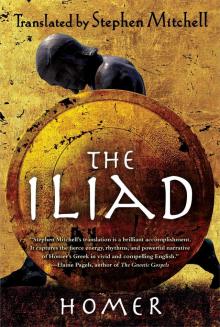 The Iliad
The Iliad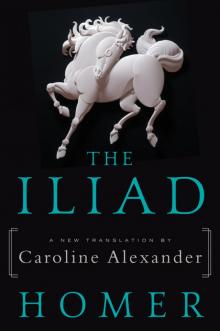 The Iliad (Trans. Caroline Alexander)
The Iliad (Trans. Caroline Alexander)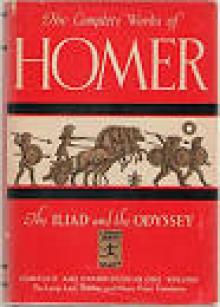 Complete Works of Homer
Complete Works of Homer The <I>Odyssey</I>
The <I>Odyssey</I>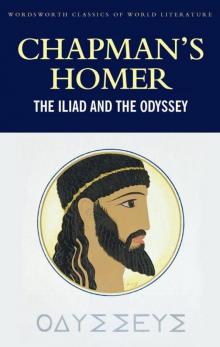 The Iliad and the Odyssey (Classics of World Literature)
The Iliad and the Odyssey (Classics of World Literature)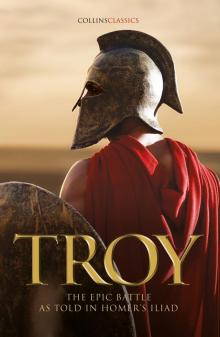 Troy
Troy The Iliad (Penguin Classics)
The Iliad (Penguin Classics) Delphi Poetry Anthology: The World's Greatest Poems (Delphi Poets Series Book 50)
Delphi Poetry Anthology: The World's Greatest Poems (Delphi Poets Series Book 50)